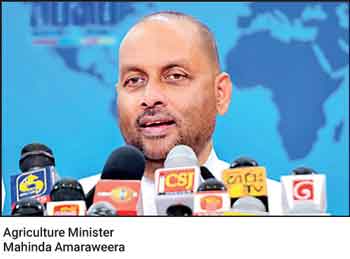Wednesday Feb 18, 2026
Wednesday Feb 18, 2026
Saturday, 16 September 2023 00:25 - - {{hitsCtrl.values.hits}}
 Agriculture Minister Mahinda Amaraweera reassured on Thursday that poultry and egg prices are expected to decrease next year and remain steady thereafter, while also confirming that there will be no need for egg import thereafter.
Agriculture Minister Mahinda Amaraweera reassured on Thursday that poultry and egg prices are expected to decrease next year and remain steady thereafter, while also confirming that there will be no need for egg import thereafter.
Speaking to journalists at the Presidential Media Centre yesterday he highlighted that although the country’s poultry and egg production industry is self-sufficient, it faced a setback due to reduced animal feed production stemming from the COVID-19 pandemic and the ensuing economic crisis.
Currently, all poultry and egg production business is driven by the private sector, with a total chicken population exceeding 3.42 million.
“By December, the majority of these chickens are projected to commence laying eggs, which will result in a notable surge in egg production countrywide. We have also permitted industrialists to import maize for poultry feed production, a move that will benefit the customers soon,” Amaraweera said.
In addition, he said the Small and Medium Scale Poultry Development Project, focusing on the production of one-day-old country chicken chicks, is set to further enhance egg production in rural areas while also improving nutrition requirements.
This project has received funding of Rs. 48 million.
Currently, the daily egg requirement in Sri Lanka stands at 7 million eggs. However, egg production has dwindled by 50% due to the pandemic and economic crisis.
Key factors contributing to this decline in egg and chicken meat production include reduced animal feed production, foreign exchange shortages for importing animal feed, and diminished local maize production. Nevertheless, the poultry industry is currently experiencing an upward trend in production.
He said recent data showed that the daily supply of around 6 million eggs, narrowing the current shortage of around 1 million eggs per day. However, it is anticipated that this shortfall can be rectified over the next three months.
Before the onset of the pandemic and economic crisis, the country’s annual chicken meat production stood at 230,000 tons, equating to a per capita consumption of 11 kg per year. However, recent challenges have led to a 30% reduction in local chicken meat production.
Industrialists are optimistic that the production of chicken meat can return to pre-crisis levels by the year-end, with the substantial addition of broiler chickens to farms. Consequently, it is anticipated that both chicken and egg prices will continue to decrease in the coming months.
The Agriculture Ministry has placed significant emphasis on livestock development in the country, initiating various programs to support this endeavour.
“Measures include promoting small and medium-scale (SME) farms, stimulating production, encouraging meat and egg exports, importing high-quality calves, developing and preserving grasslands and boosting animal feed production,” he added.
He said the mid-term Livestock Development Program has allocated Rs. 37 million to boost livestock services in the Northern Province.
In a bid to achieve self-sufficiency in milk production, both short and long-term plans have been devised. Amaraweera said the National Dairy Policy, spanning from 2023 to 2028, has been formulated to work towards this goal.
It is noteworthy that in 2021, Sri Lanka imported a total of 82,087 metric tons of milk and related products, underscoring a dependence on imports to meet domestic demand.
Additionally, 1,670 beneficiaries will receive facilities for grass and fodder cultivation and conservation, activities aimed at enhancing productivity through the management of small and medium-scale dairy farms. Furthermore, six fodder processing centres will be established.
“We also aim to enhance nine breeding farms under the Provincial Animal Production and Health Department and improve private breeding farm centres,” Minister Amaraweera announced.
The National Artificial Insemination Service has successfully produced and distributed 40,000 heifers to the cattle population along with 164,836 cow sperms annually.
Amaraweera said collaboration with the Board of Investment (BOI), a project will deploy 12,000 high-quality milk cows in the field, resulting in an annual milk production of 75 million litres.
He added that a substantial animal production farm has been inaugurated at the Polonnaruwa Farm under the auspices of the National Livestock Development Board (NLDB), with an expenditure of around Rs. 250 million.